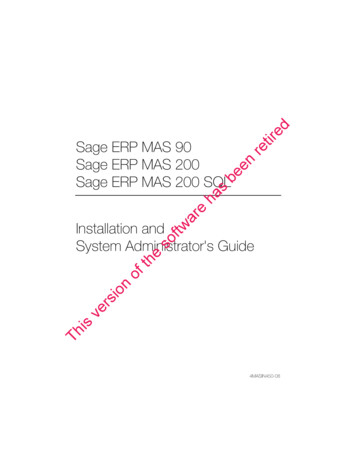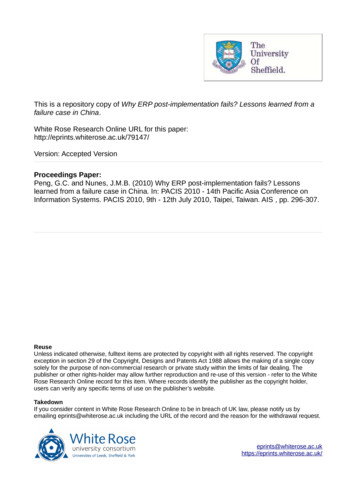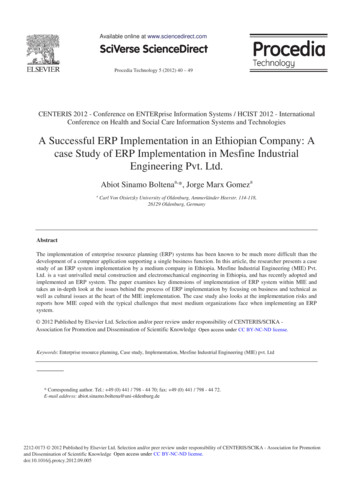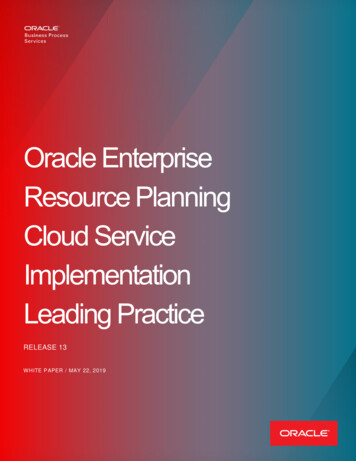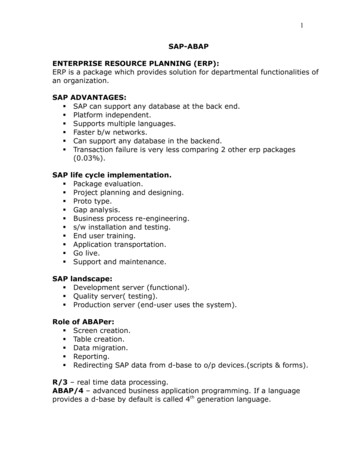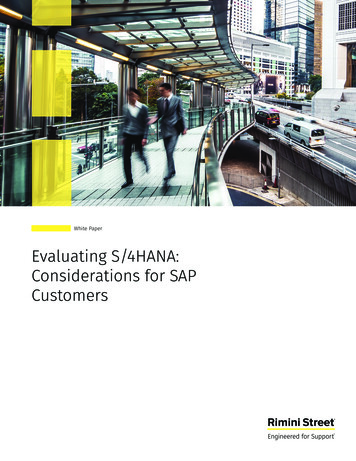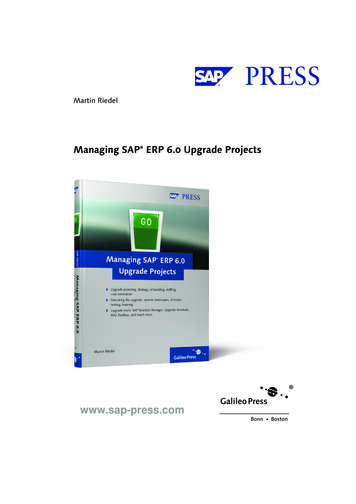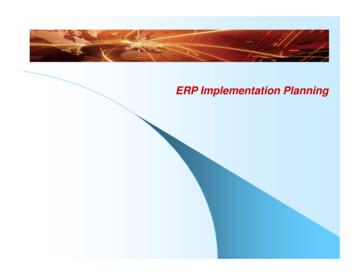
Transcription
ERP Implementation Planning
ERP Implementation Program Key phases of ERP implementation: Analysis of the company existing or designing newbusiness process descriptionsInventory of the company’s existing formal workflows ordesigning them for the key business areasERP solution(s) evaluation and pre-selection for the trial(s)ERP solution(s) trial(s)Defining (if not previously existed), formalizing andfinalizing the business process workflows based on theERP trial(s)ERP Program (multiple in-scope projects) planningERP Program execution and control – the selected ERPsolution customization, configuration, testing, staging andproduction (going live into operation)ERP program closing out and system post-implementationsupport – maintenance, upgrades, user trainingERP Implementation Planning2
Business Process Workflows Inventory of detailed process workflows for all business areasis crucial for the preparation of ERP system requirements Invoice-to-Cush process workflow example:ERP Implementation Planning3
ERP Evaluation & Trials ERP evaluation & selection activities goals: Understanding of the ERP capabilities and featuresPre-selection those ERP solution(s) for the trials that couldhelp addressing the company’s needsERP trial goals: Assessing specific ERP capabilities and featuresAnalysis of the company-specific business processesDesigning the company’s formal workflows for the keybusiness areas based of the ERP templatesDrafting the ERP features and specifications requirementsUtilizing the selection criteria to compare the ERPsolutions, based on the trial outcomes andrecommendations summarized through previous ERPsolutions analysisERP Implementation Planning4
ERP Trial Criteria The ERP trial & selection criteria may include: Good functional fit with the company’s business strategy, plans, requirements, processes, etc.Degree of integration between the various components ofthe ERP systemFlexibility and scalabilityComplexityUser friendlinessReadiness for a quick implementationFunctionality that allows to properly define (if not previouslyexisted), formalize, tune and optimize the company’sbusiness processes and workflowsERP Implementation Planning5
ERP Program Planning Covers the development of the overall program plan andits in-scope projects plans, including: Scope ManagementSchedule ManagementBudget ManagementQuality ManagementRisk ManagementHR ManagementProcurement ManagementCommunications ManagementProgram Integration ManagementAll these plans are absolutely essential to: Ensure proper control of the ERP implementation program deliveryon time and within budget Define the program activities, deliverables, timelines, budget,roles, responsibilities, etc.ERP Implementation Planning6
ERP Program Planning (cont’d) This phase also includes: Set up of the overall program and each in-scope projectadministrationsStaffing the program and the projectsSetting detailed goals and objectivesAcquiring all other required program resourcesDefining the key program metrics & KPI’sTypical Program team roles include: Program directorProject managersBusiness process team leads / analystsSolution subject matter expertsTechnical subject matter expertsSpecific business area subject matter expertsChange management specialists, etc.ERP Implementation Planning7
Example of Program Team Organization8ERP Implementation Planning
Example of Project Team Organization9ERP Implementation Planning
ERP Program Phases The ERP Implementation phases include: Technical solution acquiring and deploymentERP and business process customization – either synchronizingexisting company practices and processes with the ERP solutionor customizing it to the company processesRelevant tuning of the business processes to be mapped with theERP solution and overall business goals of the companyCustom solution testing, prototyping and staging – to simulatethe actual business processes of the company and test the ERPfunctionality through the “to be” model in a controlledenvironmentConfiguring the system to reveal the strength and the weaknessesof the company business processes and further optimize themTest cases design, pre-production testing of the business casescenarios, bugs fixing, etc.Training of the team through the implementation, including thoseto be responsible for the post-implementation supportERP Implementation Planning10
ERP Program Delivery Best Practices: ASAP11ERP Implementation Planning
ERP Implementation RoadmapProgramPreparationBusiness BlueprintRealizationFinalPreparationGoLive andSupportSetup of Local ProgramOrganizationGeneralProgram ManagementGeneralProgram ManagementGeneralProgram ManagementGeneralProgram ManagementAdaption ofStrategic FrameworkOCM OrganizationalAlignment Change AnalysisOCMOCMOCMEstablish OCMProcedures ResponsiblesEarly Adoption of BestBusiness Practice ProcessesEarly Adoption of BestBusiness Practice ProcessesEnd User TrainingSystem SupportEarly Adoption of BestBusiness Practice ProceessesTraining PlanningTraining PreparationCutover ManagementBusiness SupportTraining andDocumentation StrategyLocal Business BlueprintDocumentationConfiguration &DevelopmentBusiness SimulationInfrastructure Requirementsand DesignSecurity RequirementsUnit / Process / Integration /Business Acceptance TestingEnd User Practice in theSystemData ManagementStandards ImplementationInfrastructure PlanningInfrastructureImplementationInfrastructure FinalizationData Cleansingand Data PreparationSystem Operation StategyCompletion Check &Prepare for Next PhaseData Cleansingand Data PreparationCompletion Check &Prepare for Next Phase12ERP Implementation PlanningData Preparation & DataMigration SimulationData Migration toProductionCutover Planning& PreparationPre-Go-Live OperationsBusiness TransitionPlanning for CutoverFinal Cutover andControlled Process GoLiveCompletion Check &Prepare for Next PhaseCompletion Check &Prepare for Next PhaseProject Closing
ERP Program Phases The ERP Implementation phases include: Technical solution acquiring and deploymentERP and business process customization – either synchronizingexisting company practices and processes with the ERP solutionor customizing it to the company processesRelevant tuning of the business processes to be mapped with theERP solution and overall business goals of the companyCustom solution testing, prototyping and staging – to simulatethe actual business processes of the company and test the ERPfunctionality through the “to be” model in a controlledenvironmentConfiguring the system to reveal the strength and the weaknessesof the company business processes and further optimize themTest cases design, pre-production testing of the business casescenarios, bugs fixing, etc.Training of the team through the implementation, including thoseto be responsible for the post-implementation supportERP Implementation Planning13
Program Preparation: Major ActivitiesGoal SettingDefine goals & objectivesThe purpose: the teams go throughinitial planning and preparation forthe program and in-scope projectsImplementation strategy1.Clarify the scope of implementation2.Establish the project organization andrelevant committees and assign resourcesImplementation SequenceDefine the execution sequenceTeamCore program team project team consultant teamSign Off14ERP Implementation PlanningAt the end of phase every above steps willbe documented & will be signed off
Program Preparation: Key Areas15ERP Implementation Planning
Business Blueprint: Major ActivitiesSCOPE DOCUMENTConsists of questionnaire of entirebusiness processAS ISUnderstanding the business process fromthe core team & creation of the documentaccording to module wiseThe purpose: to achieve acommon understanding of howthe company intends to run ERPto support their business. Theresult is the Business Blueprint, adetailed documentation of theresults gathered duringrequirements workshopsTO BEThe process maps the business process inERP based on AS IS. Module -wise TO BEdocument has to be createdGAP ANALYSISThe GAP b/w AS IS process & TO BE process. Theinputs or the business process which can’t mappedinto standard ERP will be analyzed here. GAPdocument has to be createdSIGN OFFEach process above has to be takento sign off16ERP Implementation Planning
Business Blueprint: Key Areas17ERP Implementation Planning
Realization: Major ActivitiesBaselineSystem configuration & integration- Major scopeFinal ConfigurationSystem configuration & integration– Remaining scopeThe purpose: to implement all thebusiness process requirementsbased on the Business Blueprint. Thesystem configuration methodology isprovided in two work packages:Baseline (major scope); and Finalconfiguration (remaining scope)SIGN OFFEach process above has to be takento sign off18ERP Implementation Planning
Realization: Key Areas19ERP Implementation Planning
Final Preparation: Major ActivitiesUnit TestingTesting within each moduleIntegration TestingIntegrate testing of modules i.e.,combine testing of all the modulesUser TrainingThe purpose: to complete the finalpreparation (including testing, end usertraining, system management and cutoveractivities) to finalize the readiness to golive. The Final Preparation phase alsoserves to resolve all critical open issues.On successful completion of this phase, thecompany is ready to run business in thelive ERP systemCut over StrategyLegacy system will be migrated tonew ERP systemSIGN OFFEach process above has to be takento sign off20ERP Implementation Planning
Final Preparation: Key Areas21ERP Implementation Planning
ERP Production & Support The ERP system is deployed in the production mode andoperational, including: Data conversion must be doneDatabases are up and runningThe prototype is fully configured and testedThe implementation team must have tested and run the systemsuccessfully for some timeThe old business systems, if any, are removed and fully replacedby the new system for doing businessThe actual users of the system to be trained to use itPost-implementation support is critical for the ERP success: There must be enough employees who are trained to handle thesupport and issue resolution problems for the operational systemThere must be technical people in the company who have theability to enhance the system when requiredERP Implementation Planning22
Go Live & Support: Major ActivitiesProduction SupportMonitor SystemTransactionsOptimize PerformanceHelp Desk &Competency Center23ERP Implementation PlanningThe purpose: to move from aproject-oriented, pre-productionenvironment to live productionoperation
Go Live & Support: Key Areas24ERP Implementation Planning
Hi-Level Program Timeline This Program Gantt Chart reflects a high-level preliminaryestimate of the ERP Program Timeline prior to the ERP solutiontrials – more accurate one can be drafted only post-trialsERP Implementation Planning25
ERP Program (multiple in-scope projects) planning ERP Program execution and control – the selected ERP solution customization, configuration, testing, staging and production (going live into operation) ERP program closing out and system post-implementation support – maintenance, upgrades, use


